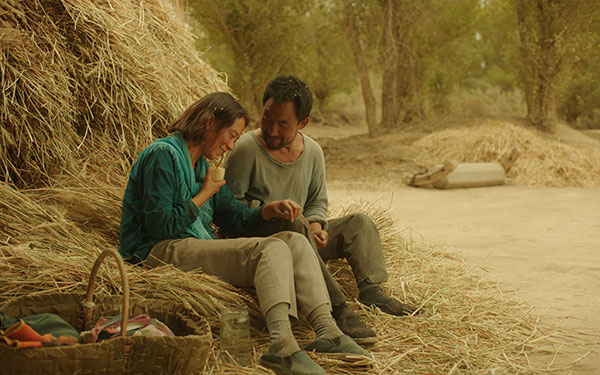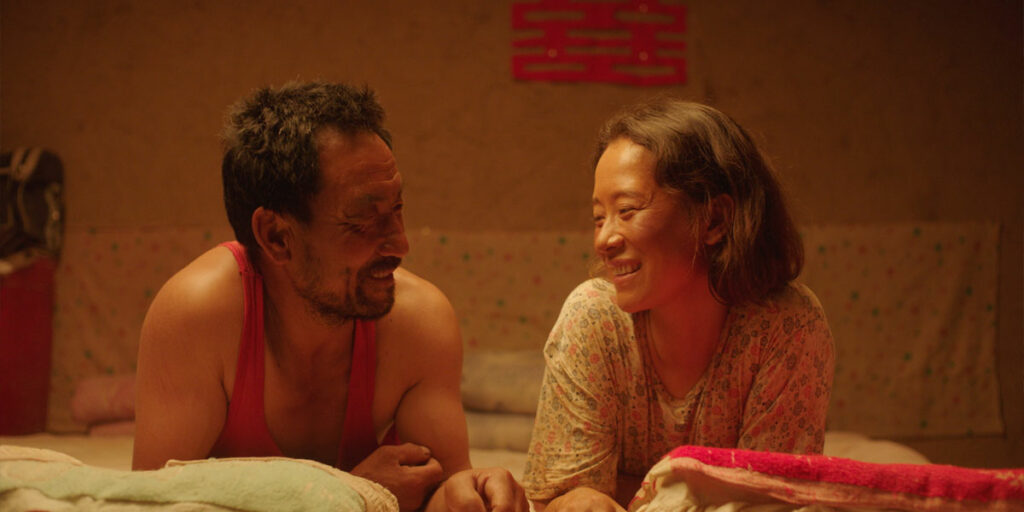Li Ruijin’s Return to Dust is both a poignant love story and an unflinching picture of life in rural China that looks stunning and radiates authenticity.
While ostensibly a tender love story between two outcasts who build a life together as farmers, there are significant socio-economic thematical elements of writer-director Li Ruijin’s Return to Dust that saw the film being abruptly removed from streaming services and cinemas in China mere weeks after its initial release. It paints a rather stark and unfavourable picture of life in north-western China, depicting the plight of its rural communities as they struggle with health, stable incomes and housing as a result of development ambition and greed. But political undertones aside, Ruijin’s film is primarily a visually stunning and poignant story about the unlikely connection between two people.
Ma Youtie (Wu Renlin) is an honest, unassuming, hardworking man often ostracised by his family, and Cao Guiying (Hai Qing) is an aging, timid, disabled woman subjected to years of abuse and being seen as a burden by her brother and sister-in-law. They form an unlikely pair, but when their families thrust them into an arranged marriage, a heartfelt connection soon blossoms between them and they find solace and comfort in each other whilst they build a life together amidst a myriad of obstacles.
Return to Dust is a very quiet film, content to linger on the naturalistic realities of life in rural China. It’s backbreaking work for Ma and Guiying as they farm wheat, make mud bricks and cart grain, flour and potatoes back and forth to the market with their beloved donkey. But they also find beauty in the smallest, most mundane things: a sparrow’s nest, pressing the shape of flowers into each other’s arms with seeds, and listening to water whistle through the glass bottles on their roof. The film is sombre but incredibly moving, and imbued with so much warmth and humanity that cinematographer Wang Weihua visualises with a shift from the stark, cool-toned snow at the beginning of the film to a more sun-soaked, golden hued life together as Ma and Guiying fall in love. It depicts the shift in them as they connect and tenderly learn to trust and take care of each other in their own small ways, with Renlin and Qing giving exquisitely thoughtful and subtle performances.

But the film also doesn’t shy away from the harsh realities of lives like theirs in rural communities. Ruijin shot and set the film in his home province of Gansu, and it’s a story of a resilience in the face of a tough means of living. “Being stuck in the field is to suffer”, muses Guiying, and she’s not exactly wrong. Ma is a humble man who settles debts and offers little resistance to others who expect and demand things from him; and so, when the government offers monetary compensation for rural dwellings in a bid to develop the land, he and Ma are forced out of their house by their greedy families. They settle further in the countryside to build their own home, and Ruijin keeps the pace slow and steady as we see just how much toil and effort goes into such a simple existence. Theirs is a tough yet tender life together, and the film beautifully captures the hard work that goes into it both outside the home and in.
It’s a stunning rumination of the complexities of rural life, the hardships and the work, but also the beauty and the affection. Return to Dust is an incredibly moving film with soul, authenticity and simplicity that portrays profound connection and offers a view into the struggles of those in countryside communities that doesn’t deserve to be censored.
Return to Dust will be released in UK and Irish cinemas from 4 November 2022.

